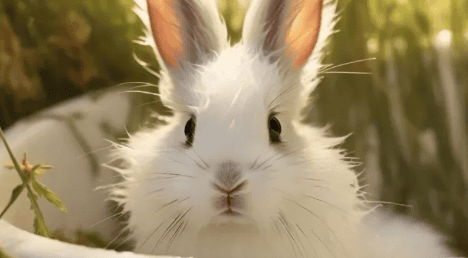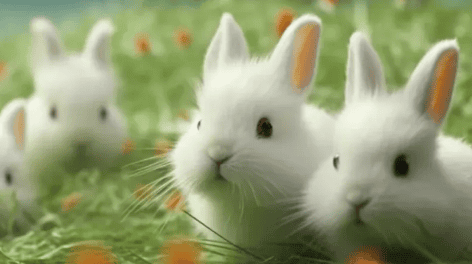Dear rabbit friends, have you noticed that your little rabbits are secretly getting older? Although rabbits can't talk, their bodies can "talk"! Today, let us reveal the seven obvious signs of aging rabbits and help you better understand and care for your elderly rabbits.
1. Lethargy
If you find that your rabbit has become particularly sleepy recently and is no longer as lively and active as before, then it may have entered the old age stage. Old rabbits need more rest to restore their physical strength due to the decline in body functions. So don’t worry if your rabbit starts to become lethargic, it’s just a sign of his natural aging.

2. Decreased appetite
As rabbits age, their digestive systems also gradually decline, causing their desire for food to decrease. You may find that your rabbit, who was always a glutton, has become picky about food and sometimes doesn't even eat much throughout the day. At this time, you can try to provide the rabbit with some more digestible food, or add some of its favorite foods to stimulate its appetite.
3. The hair turns white or rough
The hair of rabbits is an important sign of their health. As rabbits age, their fur may gradually turn gray, especially on their face and feet. At the same time, hair may become rough and dull due to a slowdown in metabolism. At this time, you can add some food rich in vitamins and minerals to your rabbit to help improve the quality of its hair.
4. Increased defecation
The intestinal motility of older rabbits may slow down, making them more prone to constipation or poor defecation. However, some older rabbits will have the opposite situation, that is, increased defecation frequency and even diarrhea. This may be due to changes in the rabbit's digestive system. If you find that your rabbit's bowel habits have changed, it is recommended to consult your veterinarian promptly for dietary adjustments or treatment.
5. Sluggish reaction
As they age, the nervous system of rabbits will gradually degenerate, causing their reactions to become slow. You may find that your rabbit is no longer as responsive to external stimuli as before, and may even appear dazed at times. This is a normal part of aging, and you can help your bunny stay active by increasing your interaction and play with it.
6. Not interested in sports anymore
When he was young, Tutu was always full of energy and liked to run and jump everywhere. However, as they enter their senior years, you may find that your rabbit becomes lazier and less active than before. This is because older rabbits' joints and muscles gradually deteriorate, making it more difficult for them to move. In order to keep your rabbit healthy, you can guide it to do some light exercise, such as walking.

7. The urine becomes clear
The urine of young rabbits is usually yellow or amber, which is a normal physiological phenomenon. However, as your rabbit ages, you may notice that its urine becomes increasingly clear. This may be due to the gradual decline of kidney function in older rabbits, resulting in less pigments and other components in the urine. Although clear urine may not mean your rabbit has a serious health problem, it is recommended that you take your rabbit to the veterinarian regularly for health checkups.
In short, when your rabbit exhibits any one or more of the above seven phenomena, it means that it has entered the old age stage. As owners, we need to take more careful care and love for them so that they can live a healthy and happy later life. If you are also a rabbit lover, please be sure to pay attention to these changes and give your rabbit more companionship and care!

 扫一扫微信交流
扫一扫微信交流
发布评论